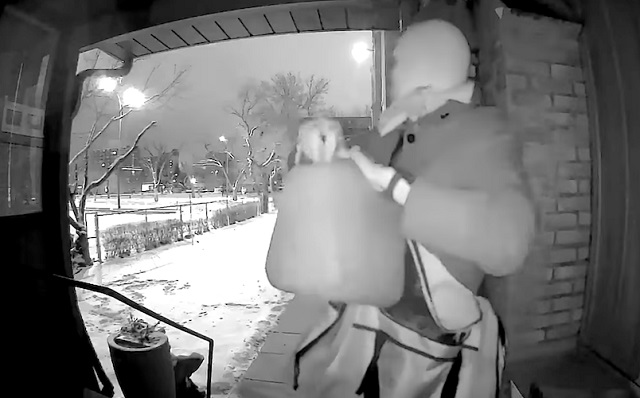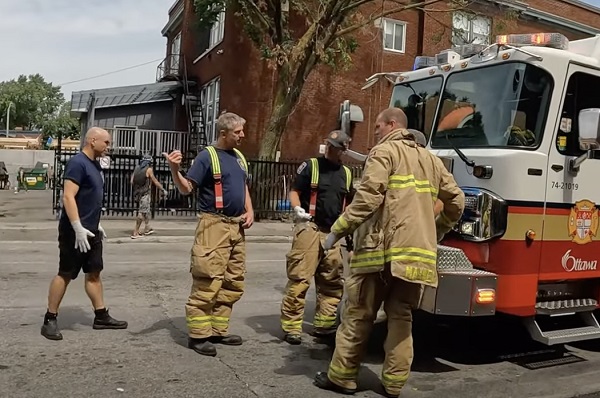Crime
Increases in sexual assaults and kidnapping, but overall crime rates in Red Deer down significantly

From the City of Red Deer
Crime statistics released for third quarter of 2018

Red Deer’s crime statistics for the third quarter of 2018 continue to show decreases in property crime totals and persons crimes when compared to the same time period in 2017. This downward trend has continued over the last four consecutive quarters, beginning in October 2017 and continuing through September 30, 2018. Total Criminal Code files also continue to show a decrease when compared to the same time periods the year before.
Property crime numbers for the third quarter show a 31% decrease in break and enters: 979 so far this year, compared to 1,129 during the same time period in 2017. Likewise, theft of motor vehicles in 2018 are at 728, compared to 1,148 for the same time period in 2017 – a 37% decrease and the lowest theft of vehicle numbers Red Deer has seen in five years.
Fraud, theft under $5,000 and mischief to property also show similar decreases. Total property crimes for 2018 have decreased to 8,977 from 12,987 over the same time frame in 2017, a 31% decrease. Property crimes numbers for the first nine months of 2018 are the lowest they’ve been in the last five years.
In persons crimes, Red Deer has seen a 29% decrease in robberies compared to the same time period in 2017. Sexual assaults, however, continue to increase – the numbers are 35% higher than the same time frame in 2017. Traffic collisions resulting in injury decreased from last year, while collisions involving property damage continue to be slightly higher than in 2017. Traffic fatalities, however, have increased – Red Deer has experienced two fatalities as a result of traffic collisions so far this year.
Red Deer RCMP have seen consistent increase in calls to the RCMP complaint line in 2018, indicating the public’s commitment to reporting crime and helping police to target hot spots. Calls to the complaint line have increased from 38,500 in the first nine months of 2017 to 39,781 in 2018, an increase of 3%.
“RCMP understand that crime feels more visible to the community than ever. It can be difficult to believe that crime rates are declining when citizens see so many reports on crime-focused social media sites, and when some businesses keep getting hit by the same handful of career criminals. But the overall numbers are in fact going down, and our commitment is to keep putting the pressure on those repeat offenders and returning them to jail at every opportunity,” says Superintendent Ken Foster, officer in charge of the Red Deer RCMP. “There are so many committed citizens in the community helping police every day, and we thank you for that.”
Crime statistics for each Alberta RCMP-policed jurisdiction are gathered by RCMP operations support analysts. These statistics are gathered in the same way for every detachment to ensure they are comparable and meet Statistics Canada requirements.
Crime
Canadian receives one-year jail sentence, lifetime firearms ban for setting church on fire

From LifeSiteNews
Jordan Willet was convicted of starting a blaze in February at Blessed Sacrament Parish in Regina, Saskatchewan.
A man who was charged with arson after trying to burn down a historic Catholic church earlier this year was handed only a one-year jail sentence for his crime but has also been banned from being able to possess firearms for life.
On April 9, a court sentenced Jordan Willet, 31, to 278 days in jail for intentionally or recklessly causing damage by fire or explosion to property and for not complying with a probation order. In February, LifeSiteNews reported that Willet had been arrested and charged with starting a fire at Blessed Sacrament Parish in Regina, Saskatchewan, on February 9.
He pleaded guilty to both charges and also received an 18-month probation sentence along with a lifetime firearm prohibition.
Over the weekend, Fr. James Hentges, the parish pastor, said he was “relieved he is in custody and is not a threat.”
The parish had posted footage of the February 9 attack on social media and put out a plea for anyone who had information on the event to report it to police.
The video footage of the attack, taken from a doorbell camera, shows Willet, in a mask, pouring fuel on the church before setting it on fire.
Fire investigators determined that the blaze was caused by a direct act of arson.
Since the spring of 2021, more than 100 churches, most of them Catholic, have been burned or vandalized across Canada. The attacks on the churches came shortly after the unconfirmed discovery of “unmarked graves” at now-closed residential schools once run by the Church in parts of the country.
In 2021 and 2022, the mainstream media ran with inflammatory and dubious claims that hundreds of children were buried and disregarded by Catholic priests and nuns who ran some of the schools.
Despite the church burnings, the federal government under Prime Minister Justin Trudeau has done nothing substantial to bring those responsible to justice or to stem the root cause of the burnings.
The claims, which were promoted by Trudeau among others, lack any physical evidence and were based solely on soil disturbances found via ground-penetrating radar.
In fact, in August 2023, one such site underwent a four-week excavation and yielded no remains.
Despite the lack of evidence, the Canadian Broadcasting Corporation (CBC) and others have continued to push the narrative, even running a report recently that appeared to justify the dozens of attacks against Catholic churches.
In January, Conservative Party leader Pierre Poilievre not only condemned the rash of church burnings in Canada but called out Trudeau for being silent on the matter.
Addictions
Liberal MP blasts Trudeau-backed ‘safe supply’ drug programs, linking them to ‘chaos’ in cities

First responders in Ottawa dealing with a crisis Fridayman 0102 / YouTube
From LifeSiteNews
‘There is certainly the perception by a lot of Canadians that a lot of downtown cores are basically out of control,’ Liberal MP Dr. Marcus Powlowski said, before pointing specifically to ‘safe supply’ drugs and injection sites.
A Liberal MP has seemingly taken issue with “safe supply” drug policies for increasing public disorder in Canada, policies his own party, under the leadership of Prime Minister Justin Trudeau, has endorsed.
During an April 15 health committee meeting in the House of Commons, Liberal MP Dr. Marcus Powlowski, while pressing the Royal Canadian Mounted Police (RCMP), stated that “safe supply” drug policies have caused Canadians to feel unsafe in downtown Ottawa and in other major cities across the country.
“There is certainly the perception by a lot of Canadians that a lot of downtown cores are basically out of control,” Powlowski said.
“Certainly there is also the perception that around places like safe supply, safe injection sites, that things are worse, that there are people openly stoned in the street,” he continued.
“People are getting cardio-pulmonary resuscitation performed on them in the street. There are needles around on the street. There is excrement on the street,” Powlowski added.
“Safe supply“ is the term used to refer to government-prescribed drugs that are given to addicts under the assumption that a more controlled batch of narcotics reduces the risk of overdose – critics of the policy argue that giving addicts drugs only enables their behavior, puts the public at risk, disincentivizes recovery from addiction and has not reduced, and sometimes even increased, overdose deaths where implemented.
Powlowski, who has worked as an emergency room physician, also stated that violence from drug users has become a problem in Ottawa, especially in areas near so-called “safe supply” drug sites which operate within blocks of Parliament Hill.
“A few months ago I was downtown in a bar here in Ottawa, not that I do that very often, but a couple of colleagues I met up with, one was assaulted as he was going to the bar, another one was threatened,” said Powlowski.
“Within a month of that I was returning down Wellington Street from downtown, the Rideau Centre, and my son who is 15 was coming after me,” he continued. “It was nighttime and there was someone out in the middle of the street, yelling and screaming, accosting cars.”
Liberal MP Dr. Brendan Hanley, the Yukon’s former chief medical officer, testified in support of Powlowski, saying, “My colleague Dr. Powlowski described what it’s like to walk around downtown Ottawa here, and certainly when I walk home every day, I encounter similar circumstances.”
“Do you agree this is a problem?” Powlowski pressed RCMP deputy commissioner Dwayne McDonald. “Do you agree for a lot of Canadians who are not involved with drugs, that they are increasingly unhappy with society in downtown cores which are this way? Do you want to do more about this, and if you do want to do more about this, what do you need?”
McDonald acknowledged the issue but failed to offer a solution, responding, “One of the success factors required for decriminalization is public support.”
“I think when you are faced with situations where, as we have experienced in our communities and we hear from our communities, where public consumption in some places may lead to other members of the public feeling at risk or threatened or vulnerable to street level crime, it does present a challenge,” he continued.
Deaths from drug overdoses in Canada have gone through the roof in recent years, particularly in British Columbia after Trudeau’s federal government effectively decriminalized hard drugs in the province.
Under the policy, which launched in early 2023, the federal government began allowing people within the province to possess up to 2.5 grams of hard drugs without criminal penalty, but selling drugs remained a crime.
The policy has been widely criticized, especially after it was found that the province broke three different drug-related overdose records in the first month the new law was in effect.
The effects of decriminalizing hard drugs in various parts of Canada has been exposed in Aaron Gunn’s recent documentary, Canada is Dying, and in U.K. Telegraph journalist Steven Edginton’s mini-documentary, Canada’s Woke Nightmare: A Warning to the West.
Gunn says he documents the “general societal chaos and explosion of drug use in every major Canadian city.”
“Overdose deaths are up 1,000 percent in the last 10 years,” he said in his film, adding that “[e]very day in Vancouver four people are randomly attacked.”
-

 COVID-194 hours ago
COVID-194 hours agoCDC Quietly Admits to Covid Policy Failures
-

 COVID-197 hours ago
COVID-197 hours agoJapanese study shows disturbing increase in cancer related deaths during the Covid pandemic
-

 Great Reset2 hours ago
Great Reset2 hours agoClimate expert warns against extreme ‘weather porn’ from alarmists pushing ‘draconian’ policies
-

 Alberta2 days ago
Alberta2 days agoDanielle Smith warns arsonists who start wildfires in Alberta that they will be held accountable
-

 Bruce Dowbiggin1 day ago
Bruce Dowbiggin1 day agoWhy Are Canadian Mayors So Far Left And Out Of Touch?
-

 National2 days ago
National2 days agoCanada’s Governor General slammed for hosting partisan event promoting Trudeau’s ‘hate speech’ bill
-

 Economy1 day ago
Economy1 day agoExtreme Weather and Climate Change
-

 International1 day ago
International1 day agoTelegram founder tells Tucker Carlson that US intel agents tried to spy on user messages






